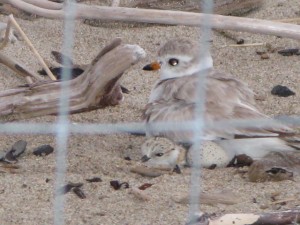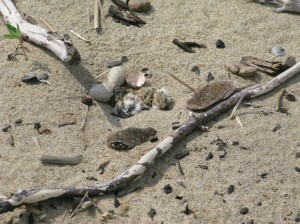The Straw that Broke the Plover Sit
The first egg was found during Memorial Day weekend. A Piping Plover egg on Hills Beach! What a treat for some of us that live on this sand spit in Saco Bay. We have waited for years.
The young man who found the egg was very excited and shared the news with his mom who called Maine Audubon. We passed out pamphlets titled “How to Live with Endangered Species.” The stake and twine went up the next day and the enclosure followed very shortly. Mother Plover stayed around laying another three eggs for a total of four camouflaged spotted sand-colored containers of life. She stayed through tides that came all the way to the enclosure’s edge. She stayed with dogs walking close to her home. She stayed through rainy cold May and windy June.
And then on the 3rd of July chicks began to hatch. Neighbors spread the word with morning “Hello’s.” “Oh! they are so cute.” Mother Plover spent the day on the nest with two chicks and two eggs.
The Fourth of July is celebrated enthusiastically on Hills Beach. Folks who don’t show up often come on this holiday to celebrate our nation’s Declaration of Independence. And as it was a long weekend this year, there was plenty of celebrating.
A home owner whose house abutted the plover enclosure had complained about beach access so Maine Audubon took down the stake and twine but left the enclosure. The owner placed his beach chairs near the edge of the enclosure and used them throughout the day. Mother Plover sat on her eggs with the head of a newly hatched chick gazing out from under her wing.
A group of teens played football for a couple of hours on the beach immediately in front of the enclosure and Mother Plover stayed. We went to rake the beach after the football game so that the chicks would not fall into the deep impressions of footprints and drown with an incoming tide. Mother Plover patiently stayed on her nest. She was there at 8:30pm as evening settled in.
At about 9:00pm the fireworks started all along the beach and went on for hours, well past midnight. Each set seemed determined to outdo the next just a bit down the beach. They have never seemed so loud or continued uninterrupted for so long. It was impossible to walk the beach because of the “rocket’s red glare.” Our neighbor said “My dog peed on the floor because of the noise.” Police were called because of the din, but no action was taken despite the fact that fireworks are currently illegal in Maine. Well, not only were we driven to near distraction but Mother Plover could not tolerate the firestorm either. She must have felt threatened for her life and left.
When we returned to the beach at 6:30am the morning of July 4th Mother Plover was nowhere to be found. There in the sand nest were two chicks covered in moist dew, dead, probably from exposure.
The Piping Plover is an endangered species in Maine. The Endangered Species Act, written in 1970, requires us to take protective action when such species are present. While people have a generally positive attitude about Piping Plovers, their occurrence necessitates more than just adoring observation. Their presence means that the human community needs to accommodate the birds with changes in our own behavior. Simple modifications in our activities and use of beach properties, such as keeping activity a few hundred yards away and not making the beach a virtual war zone with fireworks, can make all the difference in the success of Piping Plover breeding and raising of young.
Presently Maine Audubon has been running a beach monitoring program with the establishment of nest enclosures and restricted use of some beach areas. Some beaches have been designated as essential habitat. Further, beach agreements with landowners are being considered. Meanwhile fireworks, which seemed to be the straw that broke our plover’s sit, are being legalized in Maine with local communities being given the final decision in their use. As fireworks use is often concentrated in beach areas, we need to work with local communities as they develop their fireworks ordinances.
It is too late for the Piping Plovers on Hills Beach this year. Their nesting efforts came to a heartbreaking premature end, just as the life of a new generation was beginning. But their story provides an opportunity to make decisions for, hopefully, another nesting effort. So each of us needs to answer the questions, “Do we really value Piping Plovers?” “What can we do to share the beach with Piping Plovers?” “Are we willing to make the necessary changes in our behavior in order to have Piping Plovers on our beaches as a part of our lives?”


